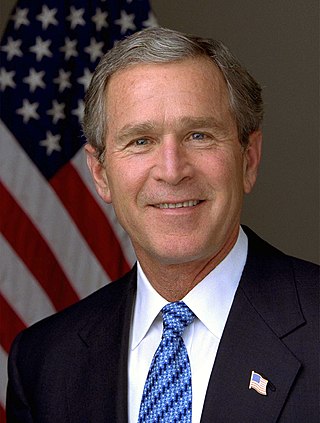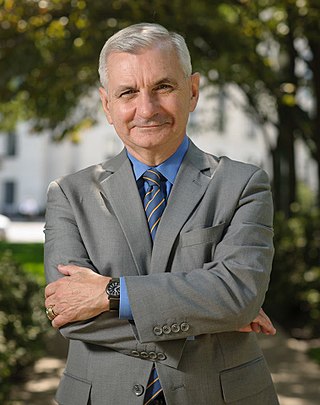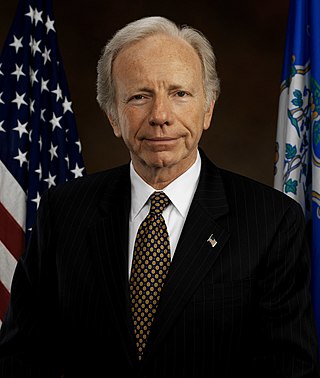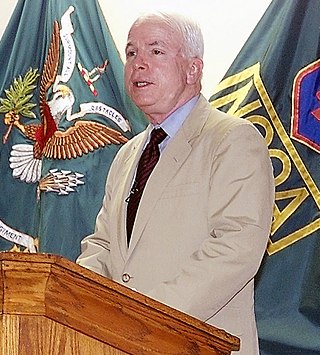
The Iraq disarmament crisis was claimed as one of the primary issues that led to the multinational invasion of Iraq on 20 March 2003.

Nancy Patricia Pelosi is an American politician who served as the 52nd speaker of the United States House of Representatives from 2007 to 2011 and again from 2019 to 2023. A member of the Democratic Party, she was the first woman elected as U.S. House Speaker and the first woman to lead a major political party in either chamber of Congress, leading the House Democrats from 2003 to 2023. A member of the House since 1987, Pelosi currently represents California's 11th congressional district, which includes most of San Francisco. She is the dean of California's congressional delegation.

George W. Bush's tenure as the 43rd president of the United States began with his first inauguration on January 20, 2001, and ended on January 20, 2009. Bush, a Republican from Texas, took office following his narrow Electoral College victory over Democratic incumbent vice president Al Gore in the 2000 presidential election, in which he lost the popular vote to Gore by 543,895 votes. Four years later, in the 2004 presidential election, he narrowly defeated Democrat nominee John Kerry, to win re-election and winning the popular vote. Bush served two terms and was succeeded by Democrat Barack Obama, who won the 2008 presidential election. He is the eldest son of the 41st president, George H. W. Bush.

John William Warner III was an American lawyer and politician who served as the United States Secretary of the Navy from 1972 to 1974 and as a five-term Republican U.S. Senator from Virginia from 1979 to 2009. He served as chairman of the Senate Armed Services Committee from 1999 to 2001, and from 2003 to 2007. Warner also served as the chairman of the Senate Rules Committee from 1995 to 1999.

Thomas Richard Carper is an American politician and former military officer serving as the senior United States senator from Delaware, having held the seat since 2001. A member of the Democratic Party, Carper served in the United States House of Representatives from 1983 to 1993 and was the 71st governor of Delaware from 1993 to 2001.

John Francis "Jack" Reed is an American lawyer and politician serving as the senior United States senator from Rhode Island, a seat he was first elected to in 1996. A member of the Democratic Party, he was the U.S. representative for Rhode Island's 2nd congressional district from 1991 to 1997. Reed graduated from the United States Military Academy and Harvard University, serving in the U.S. Army as an active officer from 1971 to 1979. He is the dean of Rhode Island's congressional delegation.

Christopher Hunter Shays is an American politician. He previously served in the United States House of Representatives as representative of the 4th District of Connecticut. He is a member of the Republican Party.

Richard Ray Larsen is an American politician serving as the United States representative for Washington's 2nd congressional district since 2001. A member of the Democratic Party, Larsen is the ranking member of the House Transportation and Infrastructure Committee.
The main event by far shaping the United States foreign policy during the presidency of George W. Bush (2001–2009) was the 9/11 terrorist attacks against the United States on September 11, 2001, and the subsequent war on terror. There was massive domestic and international support for destroying the attackers. With UN approval, US and NATO forces quickly invaded the attackers' base in Afghanistan and drove them out and the Taliban government that harbored them. It was the start of a 20-year quagmire that finally ended in failure with the withdrawal of United States troops from Afghanistan.

The domestic policy of the George W. Bush administration was the domestic policy of the United States from 2001 to 2009 while George W. Bush was president. Bush's main domestic policy advisors include Chairman of the Council of Economic Affairs Edward Lazear, Rob Portman, director of the Office of Management and Budget; U.S. Secretary of Labor Elaine Chao, Vice President Dick Cheney; U.S. Secretary of the Treasury Henry Paulson; U.S. Secretary of Commerce Carlos Gutierrez; U.S. Secretary of Health and Human Services Michael O. Leavitt and Allan Hubbard, director of the National Economic Council.

George Walker Bush is an American politician and businessman who served as the 43rd president of the United States from 2001 to 2009. A member of the Republican Party, he also served as the 46th governor of Texas from 1995 to 2000.

Joe Lieberman was an American politician who served as a United States Senator from Connecticut from 1989 to 2013. A former member of the Democratic Party, he was the party's nominee for Vice President in the 2000 election. He was an Independent prior to his death.

The 2002 State of the Union Address was given by the 43rd president of the United States, George W. Bush, on January 29, 2002, at 9:00 p.m. EST, in the chamber of the United States House of Representatives to the 107th United States Congress. It was Bush's first State of the Union Address and his second speech to a joint session of the United States Congress. Presiding over this joint session was the House speaker, Dennis Hastert, accompanied by Dick Cheney, the vice president, in his capacity as the president of the Senate.
Joe Biden, President of the United States, served as Vice President from 2009 to 2017 and in the United States Senate from 1973 until 2009. A member of the Democratic Party, he made his second presidential run in 2008, later being announced as Democratic presidential nominee Barack Obama's running mate in 2008. He was elected vice president in 2008 and re-elected in 2012. In April 2019, Biden announced his 2020 presidential campaign. He became the presumptive Democratic nominee in April 2020, was formally nominated by the Democratic Party in August 2020, and defeated Republican incumbent Donald Trump in the November 2020 election.

The 2004 presidential campaign of Joe Lieberman, the long-time United States senator from Connecticut and the vice-presidential nominee under Al Gore in the previous election, began on January 13, 2003, when he announced his intention to seek the Democratic nomination as a candidate in the 2004 presidential election. Describing his presidential hopes, Lieberman opined that his historically hawkish stance would appeal to voters. Prior to his defeat in New Hampshire, Lieberman famously declared his campaign was picking up "Joementum". On February 3, 2004, Lieberman withdrew his candidacy after failing to win any of the five primaries or two caucuses held that day. He acknowledged to the Hartford Courant that his support for the war in Iraq was a large part of his undoing with voters. Lieberman's former running candidate Al Gore did not support Lieberman's presidential run, and in December 2003 endorsed Howard Dean's candidacy, saying "This is about all of us and all of us need to get behind the strongest candidate [Dean]."

U.S. Senator John McCain, a Republican Party politician from Arizona who was a member of the U.S. Congress from 1983 until his death in office in 2018, a two-time U.S. presidential candidate, and the nominee of the Republican Party in the 2008 U.S. Presidential election, took positions on many political issues through his public comments, his presidential campaign statements, and his senatorial voting record.

Former United States Senator Harry Reid declared his position on many political issues through his public comments and his senatorial voting record.
The platform of the Democratic Party of the United States is generally based on modern liberalism, contrasting with the conservatism of the Republican Party. The party generally sits on the center-left of the American political spectrum. Currently, the party has large centrist and progressive wings, as well as smaller fiscal conservative and democratic socialist elements.
The platform of the Republican Party of the United States has historically since 1912 been based on American conservatism, contrasting with the modern liberalism of the Democratic Party. The positions of the Republican Party have evolved over time. Currently, the party's fiscal conservatism includes support for lower taxes, gun rights, government conservatism, free market capitalism, free trade, deregulation of corporations, and restrictions on labor unions. The party's social conservatism includes support for gun rights outlined in the Second Amendment, the death penalty, and other traditional values, often with a Christian foundation, including restrictions on abortion. In foreign policy, Republicans usually favor increased military spending, strong national defense, and unilateral action. Other Republican positions include opposition to illegal immigration, drug legalization, pornography and affirmative action, as well as support for school choice, and school prayer.
The following is a timeline of the presidency of George W. Bush, from January 1, 2002 to December 31, 2002.
















